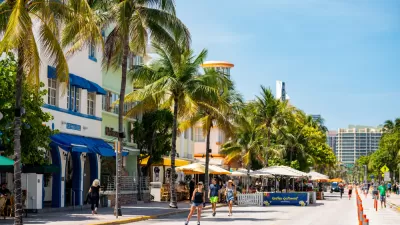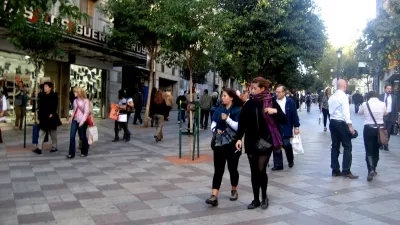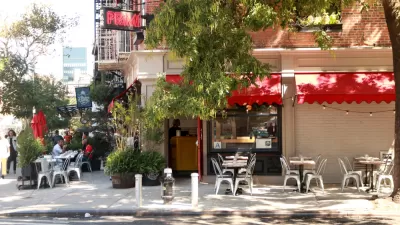With more people getting back in their cars, can pedestrian-oriented open streets survive?

When the pandemic forced restaurants to find creative ways to serve customers and people found themselves having to stay safe and sane in their own small neighborhoods, the concept of "open streets" caught on around the country as communities sought new ways to reclaim street space from cars and provide more safe outdoor space for residents. However, with COVID-19 restrictions starting to lift, writes Danielle Mudio for Politico, many formerly "open" streets have reverted to their original use.
At the height of pandemic planning, after initial reluctance from Mayor De Blasio, New York City pledged to pedestrianize 100 miles of roadway. Community groups took matters into their own hands, too: in Jackson Heights, volunteers raised $20,000 to create a 26-block open streets zone on 34th Avenue. But of the 83 miles of roadway that were eventually opened for pedestrian use during the pandemic, 22 have since shut down; "half were closed permanently while the rest shuttered temporarily for the winter, said Mitch Schwartz, a spokesperson for the de Blasio administration."
While most open streets programs were managed by volunteers, advocates say that "a redesign of city streets to include more permanent barriers, new signs and extra seating is necessary to keep cars off the roads and ensure they can be safely used by all." Because the programs often require "heroic or unusual effort by the community," writes Mudio, not all neighborhoods have the resources to maintain open streets programs without assistance from the city. Now, a coalition of "roughly 60 transportation and neighborhood groups" is calling for the city to "dedicate resources to support volunteers, provide amenities like improved barriers and provide daily programming activities." For their part, the city claims they are "considering a model that would provide reimbursement funding and technical assistance to community partners who lack resources" to implement and maintain open streets.
FULL STORY: Open Streets closed: Cars are reclaiming city blocks set aside for recreation

Alabama: Trump Terminates Settlements for Black Communities Harmed By Raw Sewage
Trump deemed the landmark civil rights agreement “illegal DEI and environmental justice policy.”

Study: Maui’s Plan to Convert Vacation Rentals to Long-Term Housing Could Cause Nearly $1 Billion Economic Loss
The plan would reduce visitor accommodation by 25% resulting in 1,900 jobs lost.

Planetizen Federal Action Tracker
A weekly monitor of how Trump’s orders and actions are impacting planners and planning in America.

Waymo Gets Permission to Map SF’s Market Street
If allowed to operate on the traffic-restricted street, Waymo’s autonomous taxis would have a leg up over ride-hailing competitors — and counter the city’s efforts to grow bike and pedestrian on the thoroughfare.

Parklet Symposium Highlights the Success of Shared Spaces
Parklets got a boost during the Covid-19 pandemic, when the concept was translated to outdoor dining programs that offered restaurants a lifeline during the shutdown.

Federal Homelessness Agency Places Entire Staff on Leave
The U.S. Interagency Council on Homelessness is the only federal agency dedicated to preventing and ending homelessness.
Urban Design for Planners 1: Software Tools
This six-course series explores essential urban design concepts using open source software and equips planners with the tools they need to participate fully in the urban design process.
Planning for Universal Design
Learn the tools for implementing Universal Design in planning regulations.
Caltrans
Smith Gee Studio
Institute for Housing and Urban Development Studies (IHS)
City of Grandview
Harvard GSD Executive Education
Toledo-Lucas County Plan Commissions
Salt Lake City
NYU Wagner Graduate School of Public Service





























